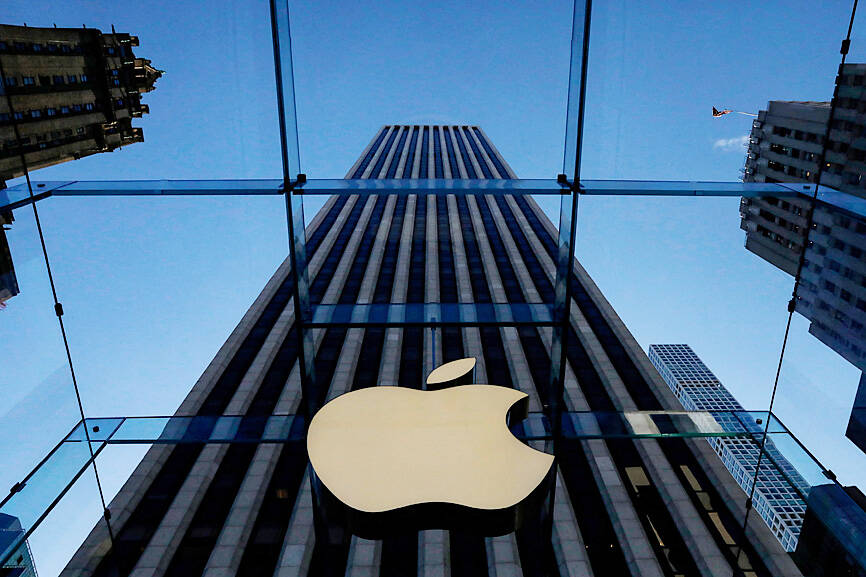Apple Inc on Wednesday said that it is beefing up defense of data that users store in the cloud, a move that could thwart authorities as well as hackers.
The iPhone maker’s Advanced Data Protection plan extends something called end-to-end encryption beyond its iMessage service to photographs and other data backed up to its iCloud storage service.
Apple said the move was urgent given an alarming increase in data breaches that had seen 1.1 billion personal records exposed across the globe last year, according to company research.

Photo: Reuters
“Advanced Data Protection is Apple’s highest level of cloud data security,” said Ivan Krstic, Apple’s head of security engineering and architecture.
It gives “users the choice to protect the vast majority of their most sensitive iCloud data with end-to-end encryption so that it can only be decrypted on their trusted devices,” he added.
Apple told the Wall Street Journal that with the heightened security, it would no longer be able to hand over iMessage history and other files, even when legally requested to do so by investigators.
The move would potentially rekindle a long period of standoffs involving technology firms and law enforcement.
Apple notably resisted a legal effort to weaken iPhone encryption to allow authorities to read messages from a suspect in a 2015 bombing in San Bernardino, California.
Police officials worldwide say encryption can protect criminals, terrorists and pornographers even when authorities have a legal warrant for an investigation.
However, civil rights and privacy advocates, along with cybersecurity professionals, advocate encrypting data to protect against wrongful snooping by authorities as well as hackers.
“We constantly identify and mitigate emerging threats to [user] personal data on device and in the cloud,” Apple senior vice president of software engineering Craig Federighi said in a post.
Under the new setting, Apple said only iCloud Mail, Contacts and Calendar would remain unencrypted because of the need to operate with other systems.
The new level of security would be available in the US by the end of this month and be rolled out globally next year, the company said.
Apple has championed data privacy as a way to differentiate itself from tech giants Meta Platforms Inc and Google, which closely track online activity by users to boost advertising revenue.
Separately, Google yesterday said that it would merge teams working on mapping service Waze and products like Google Maps, effective today, in a bid to consolidate processes.
The Alphabet Inc-owned company would integrate Waze, which it acquired in 2013 for US$1 billion, into Google Geo, its portfolio of real-world mapping products that include Google Maps, Google Earth and Street View, a Google spokesperson said.
Waze CEO Neha Parikh would exit the company following a transition period, Google said, adding that Waze would continue to be a standalone app, with about 151 million monthly active users worldwide.
“By bringing the Waze team into Geo’s portfolio of real-world mapping products, the teams will benefit from further increased technical collaboration,” the spokesperson said.
Additional reporting by Reuters

Taiwan Semiconductor Manufacturing Co (TSMC, 台積電) last week recorded an increase in the number of shareholders to the highest in almost eight months, despite its share price falling 3.38 percent from the previous week, Taiwan Stock Exchange data released on Saturday showed. As of Friday, TSMC had 1.88 million shareholders, the most since the week of April 25 and an increase of 31,870 from the previous week, the data showed. The number of shareholders jumped despite a drop of NT$50 (US$1.59), or 3.38 percent, in TSMC’s share price from a week earlier to NT$1,430, as investors took profits from their earlier gains

In a high-security Shenzhen laboratory, Chinese scientists have built what Washington has spent years trying to prevent: a prototype of a machine capable of producing the cutting-edge semiconductor chips that power artificial intelligence (AI), smartphones and weapons central to Western military dominance, Reuters has learned. Completed early this year and undergoing testing, the prototype fills nearly an entire factory floor. It was built by a team of former engineers from Dutch semiconductor giant ASML who reverse-engineered the company’s extreme ultraviolet lithography (EUV) machines, according to two people with knowledge of the project. EUV machines sit at the heart of a technological Cold

CHINA RIVAL: The chips are positioned to compete with Nvidia’s Hopper and Blackwell products and would enable clusters connecting more than 100,000 chips Moore Threads Technology Co (摩爾線程) introduced a new generation of chips aimed at reducing artificial intelligence (AI) developers’ dependence on Nvidia Corp’s hardware, just weeks after pulling off one of the most successful Chinese initial public offerings (IPOs) in years. “These products will significantly enhance world-class computing speed and capabilities that all developers aspire to,” Moore Threads CEO Zhang Jianzhong (張建中), a former Nvidia executive, said on Saturday at a company event in Beijing. “We hope they can meet the needs of more developers in China so that you no longer need to wait for advanced foreign products.” Chinese chipmakers are in

AI TALENT: No financial details were released about the deal, in which top Groq executives, including its CEO, would join Nvidia to help advance the technology Nvidia Corp has agreed to a licensing deal with artificial intelligence (AI) start-up Groq, furthering its investments in companies connected to the AI boom and gaining the right to add a new type of technology to its products. The world’s largest publicly traded company has paid for the right to use Groq’s technology and is to integrate its chip design into future products. Some of the start-up’s executives are leaving to join Nvidia to help with that effort, the companies said. Groq would continue as an independent company with a new chief executive, it said on Wednesday in a post on its Web